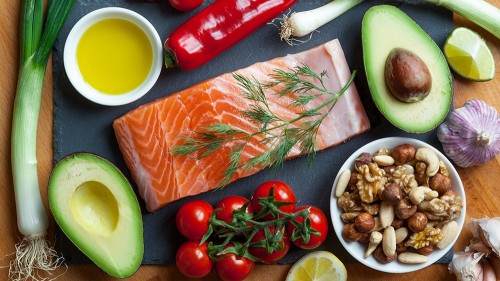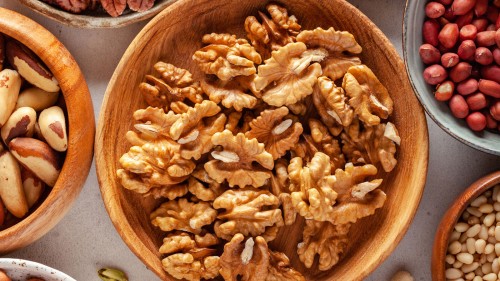The 7 Best Heart-Healthy Foods That Are Easy to Prep, According to a Dietitian
Published on April 1, 2022
Medically Reviewed by Anastasia Climan, RDN, CD-N
Your diet and lifestyle have a huge impact on your heart health. Here are some easy-to-prep foods that have been shown to improve heart health.


When it comes to improving your heart health, your diet is highly influential.
Nutrition plays a role in managing blood pressure, cholesterol, and preventing the buildup of plaque in the arteries, which contributes to heart attack and stroke risk.
Heart disease is considered a lifestyle disease, meaning it is primarily caused by lifestyle factors.
Although genetics play a role, lifestyle plays a much bigger role. Therefore, preventing, managing, or reversing disease is within your control.
Certain foods have been shown to improve heart health. Read on to learn which ones can be a part of a heart-healthy diet.
1. Almonds
Almonds have been shown to improve heart health by lowering bad cholesterol, called low-density lipoprotein (LDL), and helping maintain or increase good cholesterol, called high-density lipoprotein (HDL). (1)
Almonds are rich in both mono and poly-unsaturated fats, which play a role in decreasing heart disease risk, especially when replacing saturated fats.
They also contain important vitamins and minerals such as calcium, copper, iron, magnesium, phosphorus, potassium, zinc, manganese, thiamine, riboflavin, niacin, and vitamin E. (1)
The skin of almonds is rich in antioxidants, which help fight off free radicals that can increase inflammation.
Including 1.5 oz (42.5 g) of almond intake daily has been suggested by the U.S. Food and Drug Administration to reduce the risk of cardiovascular disease. (2)
One study noted that a similar daily intake of 45 grams of almonds can help reduce dyslipidemia, one of the most important risk factors for cardiovascular disease.
Dyslipidemia is unhealthy levels of certain fats in the blood. For example, too much bad cholesterol and too little good cholesterol. (1)
Summary
Almonds are a source of healthy fats, antioxidants, vitamins, and minerals. Including around 1.5 ounces of almonds daily can reduce the risk of heart disease by improving good and bad cholesterol levels.
2. Pulses
Pulses, including beans, lentils, and peas, are a great source of fiber. Those who include higher amounts of fiber in their diet can significantly reduce their risk of cardiovascular disease. (3)
Like almonds, including more fiber in the diet improves heart health by lowering levels of bad cholesterol (LDL) and raising good cholesterol (HDL).
Pulses specifically have been linked to a reduction in cardiovascular disease, coronary heart disease, high blood pressure, and obesity. (4)
Another way fiber is linked to improved heart health is the important role it plays in gut health. Having poor gut health has been associated with potentially higher cholesterol levels. (5)
Including pulses in the diet can increase the good bacteria in the gut, which plays a direct role in how the body metabolizes cholesterol.
It is recommended to include 25 grams of fiber daily for women and 38 grams daily for men. (6)
The Dash eating plan, which focuses on improving heart health by lowering sodium intake and increasing whole, high-fiber foods, is a great eating plan for reaching fiber goals and improving heart health.
The U.S. Dietary Guidelines recommend including a minimum of 4–5 half-cup servings of pulses per week. Get a variety, including lentils, peas, and various types of beans such as black, pinto, chickpea, and navy. (7)
Summary
Pulses like beans, lentils, and peas are packed with fiber and can lower the risk of heart disease, high blood pressure, and obesity.
Increasing fiber-rich foods like pulses can also improve gut health. A healthy gut is linked to improved heart health. Aim for 4–5 half-cup servings of pulses per week.
3. Fatty Fish
Fatty fish are high in omega-3s and have been directly linked to lowering heart disease risk.
The two primary omega-3 fatty acids found in fish beneficial for cardiovascular health are eicosapentaenoic acid (EPA) and docosahexaenoic acid (DHA).
Examples of fish that are high in EPA and DHA include:
- Salmon
- Mackerel
- Sardines
- Tuna
- Cod
- Trout
- Herring
- Halibut
Studies have shown that those who include fatty fish in their diet a few times per week cut their heart disease risk down by 50% and lowered the risk of death by a heart attack by 33% compared to those who do not consume fish. (8)
Omega-3 fatty acids also lower triglyceride levels. Triglycerides are a type of fat found in the blood. High levels of triglycerides are linked to an increased risk of heart disease. (9, 10)
In addition, including more fish in the diet can increase good cholesterol (HDL), reduce inflammation, lower resting blood pressure, and prevent blockage of the arteries. This makes omega-3 fatty acids highly protective of heart health. (8)
Dosing will vary based on specific needs and ranges from 500–4,000 mg of a combination of EPA and DHA daily through eating fish or a high-quality omega-3 supplement.
A higher dose of 4,000 mg is recommended for those who have high triglycerides.
The FDA has concluded that up to 5000 mg of DHA and EPA combined is safe to take when used as recommended. (11)
The American Heart Association recommends having fatty fish at least twice per week. (8)
Summary
Omega-3 fatty acids EPA and DHA are found in fatty fish and are directly linked to decreasing cardiovascular disease risk by lowering bad cholesterol (LDL), triglycerides, blood pressure, and inflammation, and increasing good cholesterol (HDL).
Aim for having fatty fish like salmon or tuna at least twice a week. Getting 500–4,000 mg of EPA and DHA daily is recommended. Specific doses will vary based on current health needs.
4. Whole Grains
Whole grains are high-fiber carbohydrates that have antioxidants and contain nutrients such as B vitamins, iron, folate, selenium, potassium, and magnesium. (12)
Refined and processed carbohydrates contain little to no fiber and nutrients.
Increasing whole grain intake has been consistently linked with improving heart health outcomes by decreasing disease risk. (13)
Examples of whole grains include:
- Oats
- Millet
- Barley
- 100% whole wheat breads, pastas, and crackers
- Bulgar
- Buckwheat
- Brown rice
Replacing refined grains with whole grains is linked to lowering total cholesterol, bad cholesterol (LDL), triglycerides, and insulin levels.
A 2007 analysis of 7 studies on whole grains and heart health showed that those eating at least 2.5 servings of whole-grain foods daily were 21% less likely to have cardiovascular disease issues, including heart attack, stroke, or the need for a procedure to bypass or open a clogged artery. (14)
This has also been confirmed in newer studies.
A 2016 meta-analysis of 45 studies confirmed that at least 3 servings (but up to 7.5 servings) of whole grains daily is associated with a reduced risk of coronary heart disease, cardiovascular disease, and mortality from all causes. (15)
It is recommended to consume 3–5 servings of whole grains daily, or at least half of the grains you eat should be whole.
You can do this by replacing white bread and white pasta with 100% whole grain options, choosing brown rice over white rice, and including other whole grains such as oats, millet, or barley in your daily diet. (16)
Summary
Replacing refined grains with whole-grain options can lower the risk of cardiovascular disease by lowering total cholesterol, bad cholesterol (LDL), triglycerides, and insulin levels.
Aim for 3–5 servings of whole grains, or at least half of the grains you eat should be whole.
5. Fruits and Veggies
It’s no secret that including more fruits and vegetables in your diet can improve health.
Plants have a lot of power when it comes to heart health specifically.
Higher adherence to a plant-based diet that includes plenty of fruits and vegetables lowers the risk of cardiovascular disease mortality and all‐cause mortality. (17)
What is most important is to get a variety and focus on lots of different colors. Each color of fruit and veggie contains different nutrients necessary to improve health.
Therefore, aim for eating the rainbow of colors to ensure you fill any potential nutrient gaps.
It is recommended to get 5 servings of fruits and veggies a day for the strongest health benefits. For example, include 2 servings of fruit and 3 servings of veggies daily.
Generally, one serving is a half-cup of cooked or a full cup of raw fruits or veggies.
Studies show those who consumed at least five servings of fruit and veggies daily had less risk of cardiovascular disease death, including heart disease and stroke. (18)
It is best to focus on non-starchy veggies, including broccoli, cauliflower, brussels sprouts, dark leafy greens, peppers, asparagus, green beans, and carrots.
And opt for whole fruit options rather than fruit juice to get the benefits of fiber.
Starchy veggies such as peas, corn, and potatoes were not associated with a lower risk. However, these do contain fiber and nutrients and can be part of a heart-healthy diet.
Summary
Fruits and vegetables contain fiber and a wide variety of vitamins and minerals that are protective of heart health.
Including at least 5 servings per day of fruits and veggies is recommended for the best outcome. Focus on non-starchy veggies and whole fruit.
6. Avocado
An avocado a day keeps the cardiologist away.
Avocados include primarily unsaturated fat and are packed with fiber and important heart health nutrients such as magnesium and potassium.
Including more potassium and magnesium in the diet can decrease blood pressure. (19, 20) Keeping blood pressure at healthy levels is important for decreasing heart disease risk.
They are also a good source of vitamin E, folate, vitamin C, vitamin B5, copper, and vitamin K.
Studies have shown including avocados in your diet can significantly increase your level of good cholesterol (HDL), and just one avocado a day can significantly decrease inflammation and bad cholesterol (LDL). (21, 22)
Summary
Enjoy avocados in your diet as they are linked to increasing good cholesterol while decreasing blood pressure, bad cholesterol, and inflammation. They are a nutrient-dense, high-fiber food that can help improve heart health.
7. Olive Oil
Olive oil is an unsaturated fat that is linked to improved heart health.
Consuming more than a 1/2 tablespoon per day lowers the risk of any cardiovascular disease by 15% and decreases the risk of coronary heart disease by 21%. (23)
It is recommended to replace high-saturated and trans-fat foods such as butter, margarine, full-fat creams, and mayonnaise with unsaturated fat options (olive oil).
A 5%–7% lower risk of cardiovascular and coronary heart disease may be seen when making these simple swaps. (23)
In addition, olive oil is anti-inflammatory, includes antioxidants, and can help dilate the arteries, all of which are protective factors of heart health. (24)
Summary
Enjoy at least a 1/2 tablespoon of olive daily to improve heart health outcomes by decreasing inflammation, providing antioxidants, and reducing the risk of disease.
It is best to replace saturated and trans-fat foods like butter and margarine with unsaturated fat options like olive oil.
Food as Medicine for Heart Health
Food has a lot of power when it comes to optimizing health. What you eat can make a big impact on disease management and prevention. Therefore, food really can be used as medicine.
When it comes to heart health, opt for an eating plan that can help lower your cardiovascular disease risk.
In addition to the Dash Diet eating plan, one of the top dietitian-recommended diets for improving heart health is the Mediterranean diet.
This diet includes many of the foods listed above and has been shown to reduce heart disease, cancer and diabetes risk. (25)
It is well balanced and packed with fiber and nutrients, including:
- Healthy fats from fatty fish, avocados, and olive oil
- High fiber foods such as beans, lentils, and chickpeas
- Vitamins and minerals from fruits and veggies
It also focuses on limiting dairy and red meat and increasing movement.
The Bottom Line
What you eat daily can be highly beneficial for preventing, reversing, and maintaining heart health.
A whole food diet that includes healthy fats from fatty fish, avocado, and olive oil, pulses like beans, lentils, and chickpeas, whole grains such as oats and whole-grain bread and pasta, and fruits and veggies is important.
Aim for including the following amounts of these heart-healthy foods:
- At least 2 servings of fish per week
- 5 ounces of almonds daily
- 1/2–1 avocado daily
- 5 servings of fruits and veggies daily
- 3–5 servings of whole grains daily
- 4–6 half-cup servings of pulses per week
Use food as medicine to make a healthy impact on your heart health.
At WellnessVerge, we only use reputable sources, including peer-reviewed medical journals and well-respected academic institutions.
- Almonds and Cardiovascular Health: A Review - PMC:
https://www.ncbi.nlm.nih.gov/pmc/articles/PMC5946253/ - Daily almond consumption in cardiovascular disease prevention via LDL-C change in the U.S. population: a cost-effectiveness analysis | BMC Public Health | Full Text:
https://bmcpublichealth.biomedcentral.com/articles/10.1186/s12889-020-08642-4 - Dietary Fiber Is Beneficial for the Prevention of Cardiovascular Disease: An Umbrella Review of Meta-analyses - PMC:
https://www.ncbi.nlm.nih.gov/pmc/articles/PMC5731843/ - Associations between Dietary Pulses Alone or with Other Legumes and Cardiometabolic Disease Outcomes: An Umbrella Review and Updated Systematic Review and Meta-analysis of Prospective Cohort Studies - PubMed:
https://pubmed.ncbi.nlm.nih.gov/31728500/ - The Role of Gut Microbiota on Cholesterol Metabolism in Atherosclerosis - PMC:
https://www.ncbi.nlm.nih.gov/pmc/articles/PMC8347163/ - Easy Ways to Boost Fiber in Your Daily Diet:
https://www.eatright.org/food/vitamins-and-supplements/types-of-vitamins-and-nutrients/easy-ways-to-boost-fiber-in-your-daily-diet - Legumes and Pulses | The Nutrition Source | Harvard T.H. Chan School of Public Health:
https://www.hsph.harvard.edu/nutritionsource/legumes-pulses/ - Omega-3 Fatty Acids and Heart Health:
https://www.ahajournals.org/doi/full/10.1161/CIRCULATIONAHA.114.015176 - Elevated Triglyceride Level Is Independently Associated With Increased All-Cause Mortality in Patients With Established Coronary Heart Disease: Twenty-Two-Year Follow-Up of the Bezafibrate Infarction Prevention Study and Registry - PubMed:
https://pubmed.ncbi.nlm.nih.gov/26957517/ - Triglycerides and cardiovascular disease:
https://www.thelancet.com/journals/lancet/article/PIIS0140-6736(14)61177-6/fulltext - Omega-3 Fatty Acids - Health Professional Fact Sheet:
https://ods.od.nih.gov/factsheets/Omega3FattyAcids-HealthProfessional/ - Whole Grains | The Nutrition Source | Harvard T.H. Chan School of Public Health:
https://www.hsph.harvard.edu/nutritionsource/what-should-you-eat/whole-grains/ - The Effect of Replacing Refined Grains with Whole Grains on Cardiovascular Risk Factors: A Systematic Review and Meta-Analysis of Randomized Controlled Trials with GRADE Clinical Recommendation - PubMed:
https://pubmed.ncbi.nlm.nih.gov/32933853/ - Whole grain intake and cardiovascular disease: a meta-analysis - PubMed:
https://pubmed.ncbi.nlm.nih.gov/17449231/ - Whole grain consumption and risk of cardiovascular disease, cancer, and all cause and cause specific mortality: systematic review and dose-response meta-analysis of prospective studies | The BMJ:
https://www.bmj.com/content/353/bmj.i2716 - Grains | MyPlate:
https://www.myplate.gov/eat-healthy/grains - Plant‐Based Diets Are Associated With a Lower Risk of Incident Cardiovascular Disease, Cardiovascular Disease Mortality, and All‐Cause Mortality in a General Population of Middle‐Aged Adults:
https://www.ahajournals.org/doi/10.1161/JAHA.119.012865 - Fruit and Vegetable Intake and Mortality Results From 2 Prospective Cohort Studies of US Men and Women and a Meta-Analysis of 26 Cohort Studies:
https://www.ahajournals.org/doi/pdf/10.1161/CIRCULATIONAHA.120.048996 - How Potassium Can Help Control High Blood Pressure | American Heart Association:
https://www.heart.org/en/health-topics/high-blood-pressure/changes-you-can-make-to-manage-high-blood-pressure/how-potassium-can-help-control-high-blood-pressure - Hypertension: Effects of Magnesium Supplementation on Blood Pressure, A Meta-Analysis of Randomized Double-Blind Placebo-Controlled Trials:
https://www.ahajournals.org/doi/10.1161/hypertensionaha.116.07664 - A Moderate-Fat Diet with One Avocado per Day Increases Plasma Antioxidants and Decreases the Oxidation of Small, Dense LDL in Adults with Overweight and Obesity: A Randomized Controlled Trial - PMC:
https://www.ncbi.nlm.nih.gov/pmc/articles/PMC7373821/ - Avocado consumption and risk factors for heart disease: a systematic review and meta-analysis | The American Journal of Clinical Nutrition | Oxford Academic:
https://academic.oup.com/ajcn/article/107/4/523/4964644 - Circulation: Abstract P509: Olive Oil Consumption and Risk of Cardiovascular Disease:
https://www.ahajournals.org/doi/10.1161/circ.141.suppl_1.P509 - Extra Virgin Olive Oil and Cardiovascular Diseases: Benefits for Human Health | Bentham Science:
http://www.eurekaselect.com/article/86859 - Mediterranean Diet and Prevention of Chronic Diseases - PMC:
https://www.ncbi.nlm.nih.gov/labs/pmc/articles/PMC5625964/






